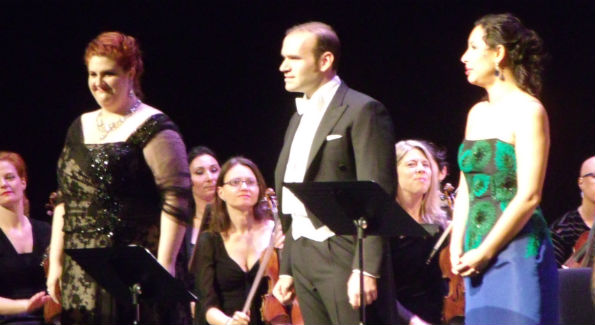REVIEW: An obscure Verdi opera performed by Washington Concert Opera is well received.
By Patrick D. McCoy

Soprano Tamara Wilson, tenor Michael Fabiano and soprano Nicole Cabell take a bow together.
(Photo by Patrick D. McCoy)
When the Italian operas of Giuseppe Verdi are the subject of conversation, there are a few that immediately come to mind. Without question, “Nabucco,” “Ernani,” “Don Carlos,” “Rigoletto,” “Il Trovatore” and “La Traviata” make the list of his most beloved and popular operas. But for this particular performance, the Washington Concert Opera chose to turn its attention to one of his lesser known operas: “Il Corsaro.”
Sopranos Nicole Cabell and Tamara Wilson along with tenor Michael Fabiano starred in their lead roles as Medora, Gulnara and Corrado respectively, while bass Eduardo Castro (Giovanni), tenor Wayne Jennings (the eunuch), tenor Tad Czyzewski (the slave) and tenor Patrick Toomey (Selimo) sang supporting roles, but were among the crowd favorites. The Washington Concert Opera Chorus punctuated the idea of a carefree life in their role as the corsairs, while Fabiano’s lyrical tenor offered contrasting lament.
Taking the audience on a journey to the Turkish city of Coron, music director Antony Walker led the orchestra in the overture, which gave hints to the progression of the opera’s plot. The dark, lyrical violins gave way to sensuality, yet hinted at the suspense of the storyline in the pizzicato articulation later on by the strings. As the captain, Fabiano entered Act I with great authority, both in stage presence and musicality. Tasteful cadenzas and the ability to sing into the full capacity of the hall made his voice thrill the listener to great effect. His show-stopping delivery of the aria “Si di Cosari if fulmine” accorded the tenor a well deserved ovation. In her role as the love interest of Corrado, Cabell brought a lovely, warm quality to her singing that gave way to both Medora’s beauty and treachery all at the same time.
In her role as favorite of Pasha Seid’s harem girls (Gulnara), soprano Tamara Wilson had perhaps some of the most demanding singing of the evening. Wilson sang consistently with remarkable dynamic contrast and a well-capped high ending to her often climatic vocal lines. Though she was playing the role of a woman that society often looks down upon, her elegant vocalism allowed the inner aspect of such a person to shine through, revealing the character’s true essence. Washington audiences may recall Wilson singing at the NEA Opera Honors a few years ago in tribute to soprano Martina Arroyo.
Act III was a showcase for baritone Sebastian Cantana. As Pasha Seid, Cantana was the perfect vocal partner to Wilson’s Gulnara. His rich baritone in dialogue with the declamatory lines of the soprano set the perfect vignette for the tragedy that was about to occur. Returning towards the end of the opera were Cabell and Fabiano, who both tragically met their doom.
There is an old saying that “familiarity breeds contentment.” In this case, the Washington Concert Opera stepped outside of what is familiar to expose its audience to a hidden treasure. This type of innovative programming keeps the golden age of opera alive. A risk maybe, but a success definitely.
Recently named among the Forty Under 40 for his contributions to arts and humanities, Patrick D. McCoy received a B.M. in vocal performance from Virginia State University and a M.M. in church music from the Shenandoah Conservatory in Winchester, Va. , where he serves on the alumni board of directors. He has contributed arts and culture pieces to CBS Washington, The Afro-American Newspaper and the newly published book, “In Spite of the Drawbacks” (Association of Black Women Historians), which includes his chapter on legendary soprano Leontyne Price. McCoy has interviewed some of the most acclaimed artists of our time, including Renée Fleming, Joshua Bell, Martina Arroyo, Denyce Graves, Eric Owens, Norman Scribner, Julian Wachner, Christine Brewer and Lawrence Brownlee. He is music director at Trinity Episcopal Church, DC. Listen to these interviews and others at Blog Talk Radio. Additionally, he is a member of the Music Critics Association of North America. McCoy may be reached via email at wlperformingarts@aol.com and on Twitter @PatrickDMcCoy.




